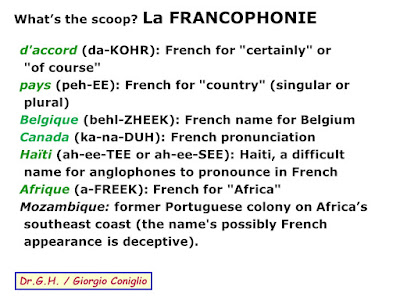PARODY COMPOSED: Giorgio Coniglio (registered pseudonym) and Dr. GH, December 2018. Today's verses have been web-published at OEDILF.com, an online humour dictionary that has accumulated 102,000 carefully edited limericks.
SONGLINK: For those readers who like poetry set to music: On our sister blog "SILLY SONGS and SATIRE", you can find various singable versions of limerick medleys, including a collection of verses about French set to a novel tune.
By the way, to find more limericks, or any other search target on either of these 2 blogs, use the SEARCH-FUNCTION found at the top of the right-hand margin.
Authors' Note: The present participle (participe présent) is used much less commonly in French compared to English. In contrast, infinitives are used more often, so 'knowing and doing' is described by savoir-faire, whereas sachant-faisant seems à rire (laughable).
All the French verbs mentioned here, as well as avoir, to have, are irregular, so their roots undergo weird transformations in some circumstances. Savant, an archaic form derived from savoir, is still in use as a noun for 'someone who knows' (a prodigy).

Authors' Note:
à propos: in regard
outré: inappropriately eccentric in behaviour or appearance, or exceeding the limits of propriety�
sans doute (sahn DOOT): certainly, without doubt
paraph (PA-ruhf): confirmatory mark after a signature, derived more remotely from the French term paraphe
nonpareil: a paragon, one who has no equal
Although the word nonpareil has been used in English, often pronounced as non-pah-REHL, since the 16th century, one must adopt the snobbier French pronunciation (non-pah-RAY) for the verse to rhyme.
Despite its status as a longstanding valuable English descriptor, unique retains a Gallic sound, which is frankly ... unique.
Authors' Note:
au verso (oh vehr-SOH): French for 'on the reverse side'
Bilingual labelling can produce startling results. In Canada, pomegranates and their juice must be imported. But, in French-speaking parts of the country, we would refer to them as grenades, the modern French term for the fruit. In the circumstance under discussion, the particular juice-box was labelled on its French side as grenade.
An archaic term, pomegranate derives from the Middle Ages, but seems to have gotten stuck in English as a sort of borrowed anachronism.



Authors' Note:
corniches (cohr-NEESH): French shortened expression for routes en corniche, "roads on the ledge" that epitomize the spectacular views along the Côte d'Azur (French Riviera)
roué: (roo-AY, or anglicized, as here, ROO-ay): French for an elderly debauched man, derived from the outdated meaning of "broken on the wheel“, (la roue being French for "wheel").
Authors' Note:
au verso (oh vehr-soh): French for 'on the reverse side'
Bilingual labelling, if you pay attention to it, can produce some startling results. In Canada, pomegranates and their juice must be imported. But, in French-speaking parts of the country, we would refer to them as grenades, the modern French term for the fruit. In the circumstance under discussion, the particular juice-box was labelled on its French side as (jus de) grenade.
An archaic term for the tree and for the fruit, pomegranate derives from the Middle Ages, but seems to have gotten stuck in English as a sort of borrowed anachronism. On the other hand, we have grenadine syrup, a cocktail additive, putatively made from pomegranate juice, but in fact, often concocted from synthetic ingredients.
(Note that the three verses of this "brief saga" can be found in more readily legible format on the blog "Daily Illustrated Nonsense"; click HERE.)
DIRECTION FOR WEB-TRAVELLERS: (updated June 2024)
To resume daily titillations on our related blog "Daily Illustrated Nonsense", click HERE. Once you arrive, you can select your time frame of interest from the calendar-based listings in the righthand margin, and check the daily offerings for any month in the years 2020 to the present. (As of June 2024, there are over 1500 unique entries available on the Daily blog, and most of these are also presented here on "Edifying Nonsense" in topic-based collections.) The "Daily" format has the advantage of including Giorgio's photo-collages, song-lyrics and other material that are not shown here on this topic-based blog.



















No comments:
Post a Comment